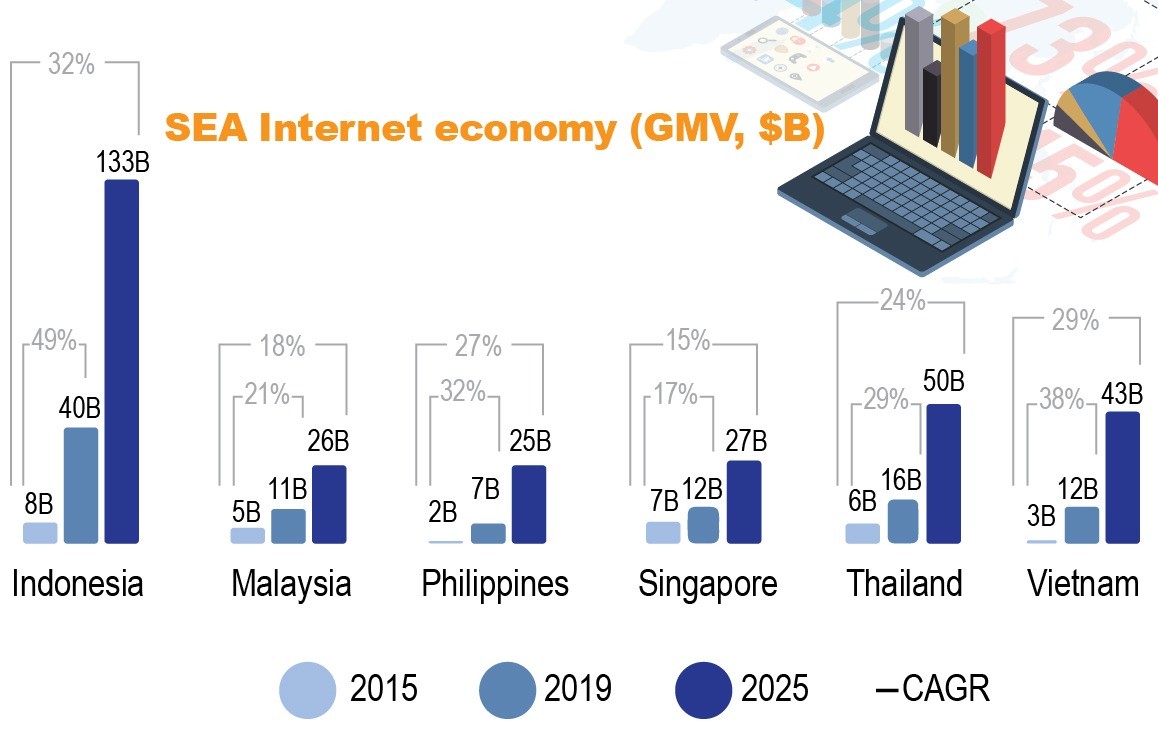Unlocking Philippine-Indonesia cooperation on digital trade
The Philippines and Indonesia should really lobby within the region and mobilize support for ASEAN’s vision to become the leading digital community and economic bloc.
Change Size

T
he Philippines and Indonesia share strong cultural and historical ties that go beyond close geographical links and shared experiences of the past. The combined population of the Philippines and Indonesia accounts for more than half of ASEAN’s population. Indonesia is the Philippines’ ninth major trading partner last year, 16th top export market, and fifth chief import source.
But we can still maximize this trade relationship further, and one clear opportunity is for more collaboration and cooperation on areas of mutual interest, like digital trade and e-commerce, where the pandemic has forced us to adapt to the changing global situation.
Like the rest of the world, the Philippine economy was severely affected by the pandemic. With the spread of COVID-19, the Philippine government undertook swift actions and imposed lockdown measures that resulted in the temporary closure of business establishments. Indonesia is no different and in fact, has its own experience imposing movement restrictions to address the surge in COVID-19 cases. Unfortunately, the Micro, Small, and Medium Enterprises (MSMEs) were among those severely affected by the economic effects of the pandemic.
Amidst these challenges, the Philippines and Indonesia saw how these MSMEs pivot their business models and shift to e-commerce and digital technologies as the world further adopted digital technologies and digital economy for the continued provision of goods and services.
According to the Google Temasek 2020 Report, there was a significant increase in the number of internet users in the ASEAN region from 360 million in 2019 to 400 million in 2020. The internet economy has also grown amidst a slowdown in economic activity from US$100 billion in 2019 to $105 billion in 2020. Online digital services likewise experienced a significant uptick in new digital consumers, with education, groceries, and lending experiencing a significant increase in the number of new users—from 32 percent to 55 percent.
In this respect, the Philippines and Indonesia should really lobby within the region and mobilize support for ASEAN’s vision to become the leading digital community and economic bloc that is powered by secure and transformative digital services, technologies, and ecosystem. These elements will be crucial in the development of a more robust and responsive e-commerce environment in the ASEAN.
Further, the Philippines and Indonesia also saw exponential growth in new consumers to Internet economy services, growing by around 37 percent. Under this backdrop, it is even more timely for both countries to exchange best practices on how they were able to assist MSMEs’ transition to digital in the time of the pandemic.
On the part of the Philippines, the invaluable role of e-commerce in the country has long been recognized. Since then, the public and private sectors have led efforts to promote electronic transactions and create a safer environment for online consumers and merchants.
With the updated E-commerce Philippines 2022 Roadmap, it is the aim of the country to increase the contribution of e-commerce to gross domestic product. To this end, the roadmap’s goals are: double the number of local e-commerce enterprises from 500,000 in 2020 to a million by 2022; develop a digitally skilled workforce to support the growing e-commerce sector; empower online consumers; and build trust between merchants and buyers.
Additionally, the Philippines intends to have the United Nations Electronic Communications Convention (ECC) ratified. This is the only treaty that deals with e-commerce by facilitating the use of electronic communications in international trade and building extensively on the fundamental principles of the uniform law of e-commerce developed by the United Nations Commission on International Trade Law (UNCITRAL). Having the ECC ratified is also aligned with the “Vision for Cross Border e-Commerce in ASEAN” by the US-ASEAN Business Council.
In Oxford Business Group’s Report on Indonesia’s Digital Economy COVID-19 Recovery Roadmap in July 2021, it cited that the International Monetary Fund (IMF) expects Indonesia to experience robust expansion in this sector as the digital economy remains a key driver of growth, owing to the large, consumption-driven domestic market and the accelerated uptake of digital tools over 2020.
On another hand, the World Bank (July 2021) suggests that Indonesia should leverage digital technologies for greater inclusion and emphasizes three policy priorities – boost digital connectivity and universalize access to high-quality internet, ensure that the digital economy works for all, and lastly, use digital technologies to provide better public services, improve the quality of citizen-and-state interactions, and build trust in the digital world.
As we build back better, there is so much to learn from the experiences of Indonesia and the Philippines. However, it is clear that both countries’ MSMEs should take full advantage of this uptrend in digital trade and e-commerce to facilitate the post-pandemic economic growth and recovery of both of our nations.
It is important to highlight that the convening of the second edition of the ASEAN Online Sale Day last August is instrumental in giving MSMEs a digital platform to sell their goods and services, as well as in boosting the much-needed confidence in online consumer trade in the region.
***
The writer is Filipino diplomat who serves as the commercial attaché and Philippine economic official to ASEAN. These views expressed are his own.









